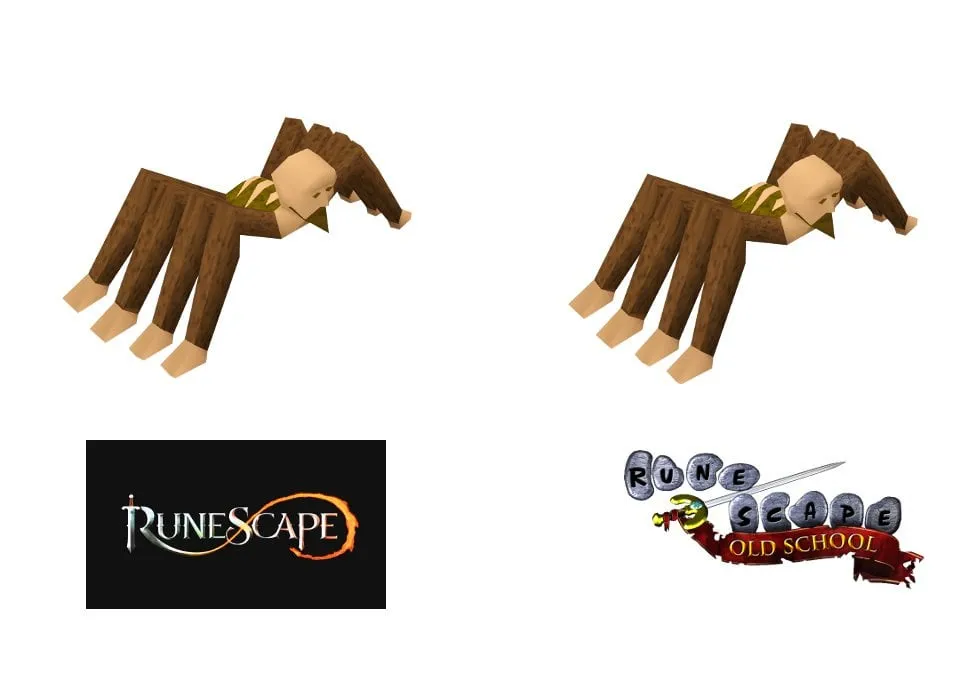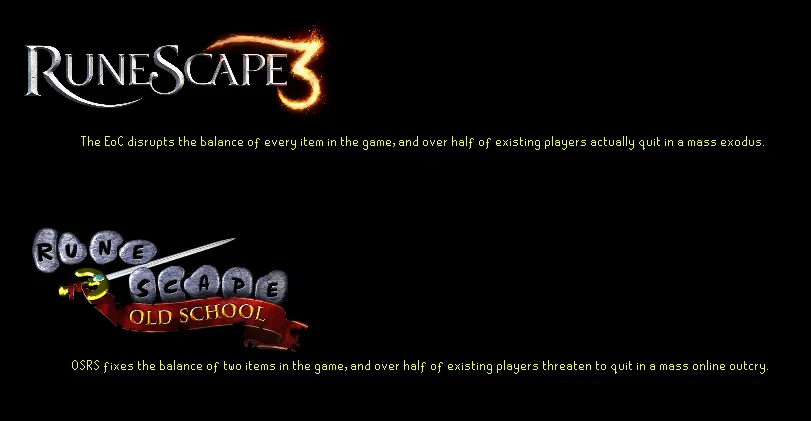Your cart is empty
Is RS3 Easier Than OSRS? A Comprehensive Comparison

RuneScape 3 (RS3) and Old School RuneScape (OSRS) are two distinct versions of the iconic MMORPG, each catering to different player preferences. RS3 offers modern graphics and updated gameplay mechanics, while OSRS maintains a nostalgic experience with its classic design and gameplay. Understanding their differences is essential for players deciding which version to immerse themselves in. This article explores the fundamental aspects of both versions to provide clarity on which may be easier or more appealing to new and veteran players alike.
When comparing the gameplay mechanics of RS3 and OSRS, several key differences emerge that impact the overall player experience. One of the most significant changes in RS3 is the introduction of the Evolution of Combat (EoC) system. This system revamped the combat mechanics, introducing abilities, cooldowns, and a more dynamic combat style. Players in RS3 can utilize a variety of attack styles and abilities, leading to more complex combat encounters. In contrast, OSRS retains the traditional click-and-wait combat system, which some players find simpler and more accessible.
Another major difference lies in the user interface. RS3 features a customizable interface that allows players to modify their screen layout, resize components, and access various features more conveniently. OSRS, however, maintains a more straightforward and static interface, reflecting its classic roots. While the customizable interface in RS3 can enhance gameplay for some, others may prefer the simplicity of OSRS‘s design.
Skill progression also varies between the two versions. In OSRS, players experience a more linear skill leveling system, which some may find easier to navigate. The experience rates in OSRS are generally slower, promoting a sense of achievement over time. Conversely, RS3 offers more varied training methods and faster experience gains, allowing players to level up skills more quickly. This can make RS3 feel more casual-friendly, but it may also lead to a steeper learning curve for players who are new to the game.
Additionally, RS3 features a wealth of additional content, including quests, items, and skills that have been developed over the years. This abundance of content can make RS3 feel overwhelming for new players. OSRS, with its more limited content, offers a more focused experience that may be easier for newcomers to grasp.
Lastly, the community and player interaction aspects differ significantly between the two versions. OSRS is known for its strong community-driven updates and the influence of player feedback on game development. This collaborative approach fosters a sense of belonging among players. RS3, while also community-oriented, is more focused on developer-led changes, which can create a different dynamic in terms of player engagement.
In summary, the gameplay mechanics in RS3 and OSRS present contrasting experiences shaped by combat systems, interfaces, skill progression, content availability, and community involvement. Players’ preferences for simplicity versus complexity will ultimately guide their choice between the two versions.
Combat Systems: RS3 vs OSRS

When it comes to combat systems, RS3 and OSRS adopt distinct approaches that cater to different player preferences. Let’s break it down:
- Combat Styles:
- RS3: Features a more action-oriented combat system, allowing players to choose from various combat styles. This includes melee, ranged, and magic, with the incorporation of abilities that can be activated during fights.
- OSRS: Sticks to a more traditional turn-based combat system, where players select their attack styles without the use of special abilities. This format can feel more straightforward for players who enjoy classic RPG mechanics.
- Abilities and Special Attacks:
- RS3: Introduces an array of abilities that players can unlock and use strategically during combat. This system adds depth and complexity, as players can customize their abilities to suit their playstyle.
- OSRS: Lacks this feature, focusing instead on simpler mechanics. Players rely on traditional skills and equipment bonuses, which can be appealing for those who prefer a less complicated combat experience.
- Targeting System:
Ultimately, whether RS3’s more complex combat system is easier or more enjoyable than OSRS’s traditional approach depends on individual player preferences. If you enjoy fast-paced, strategic gameplay, RS3 might be your cup of tea. However, if you lean towards simplicity and nostalgia, OSRS could be your ideal choice.
Quests and Storylines: A Comparative Analysis

Quests and storylines form the backbone of any MMORPG, and both RS3 and OSRS offer unique experiences in this regard. Here’s how they stack up against each other:
- Quest Design:
- RS3: Features a vast array of quests, many of which are rich in lore and often require players to engage in diverse gameplay elements, including mini-games and puzzles. The quests are generally designed to be more cinematic, providing a narrative depth that immerses players.
- OSRS: Also boasts a wide selection of quests, with a focus on classic questing experiences. While some quests may lack the complexity found in RS3, they often capture the charm and humor that many players appreciate.
- Storylines:
- RS3: Exhibits an evolving storyline with frequent updates, giving players a sense of progression in the game’s lore. The narrative threads are often interconnected, enhancing the overall storytelling experience.
- OSRS: Primarily revolves around standalone quests that contribute to the game’s overall lore but don’t necessarily evolve. This can be appealing to players who enjoy a more traditional RPG narrative structure.
- Quest Requirements:
In conclusion, RS3 offers a more modern, narrative-driven questing experience, while OSRS leans into nostalgia and simplicity. Choosing between them will depend on whether you prefer intricate storytelling or straightforward, classic quests.
Skills and Leveling: Which Game is More Accessible?
When diving into the world of RuneScape, one of the first things players notice is the difference in skills and leveling between RS3 and OSRS. Both games have their unique charm, but they cater to different types of gamers when it comes to skill accessibility and progression.
In RS3, leveling is generally more user-friendly. Here’s why:
- Experience Rates: RS3 offers faster experience rates, making it easier to level up skills quickly. Players can reach high levels in a shorter timeframe.
- Training Methods: The game provides a variety of modern training methods, including Dungeoneering and Divination, which can yield substantial experience.
- Quests and Events: Frequent updates and quests offer unique rewards and experience bonuses, making leveling feel rewarding and engaging.
On the flip side, OSRS takes a more traditional approach:
- Experience Rates: Leveling is slower, which can be frustrating for some. However, it allows for a deeper sense of achievement.
- Skill Variety: OSRS features skills like Agility and Hunter that require more time and effort, which might deter casual players.
- Community Input: The game often relies on community feedback for updates, which means players have a say in how skills evolve.
In summary, if you’re looking for a more accessible and quicker leveling experience, RS3 is your go-to. But if you appreciate the grind and the sense of accomplishment that comes with it, OSRS might be more your style.
Community and Social Aspects: Engaging with Other Players
Community is a crucial aspect of any MMORPG, and both RS3 and OSRS have vibrant player bases, but they offer different social experiences. Let’s break it down.
In RS3, the community is largely shaped by:
- Diverse Player Base: The game attracts a wide range of players, from casual gamers to hardcore enthusiasts, leading to a melting pot of ideas and strategies.
- In-game Events: Frequent events and updates encourage players to gather, fostering camaraderie and competition.
- Clan System: RS3 has a robust clan system, allowing players to form groups with shared interests, enhancing social interaction.
Conversely, OSRS promotes a different kind of social engagement:
- Nostalgic Community: The player base is often more nostalgic, reflecting on the game’s early days, which creates a unique bond among players.
- Player-driven Economy: The game’s economy relies heavily on player interactions, making trading and bartering a more social experience.
- Ironman Mode: This mode encourages players to rely solely on themselves, yet fosters a unique community spirit around sharing tips and achievements.
Ultimately, the choice between RS3 and OSRS in terms of community comes down to what you enjoy. If you prefer frequent events and clan activities, RS3 is likely your best bet. However, if you value nostalgic connections and a player-driven economy, OSRS might feel more like home.
Is RS3 Easier Than OSRS? A Comprehensive Comparison
When comparing RuneScape 3 (RS3) and Old School RuneScape (OSRS), one of the most frequently debated topics is the difficulty level of each game. Both games offer unique experiences, but their mechanics and gameplay can influence how players perceive their difficulty.
Here are some key differences that contribute to the overall difficulty:
- Combat Mechanics: RS3 utilizes an ability-based combat system, allowing players to use a range of skills and abilities strategically. OSRS, on the other hand, relies on a more traditional click-and-attack method, which can be simpler for some players.
- Progression Systems: RS3 features a more complex skill progression system with additional skills and methods for leveling up, while OSRS sticks to the classic skills and leveling mechanics, making it easier to understand for new players.
- Quests and Content: Both games have extensive quest lines, but RS3 has more modern quests that often require higher-level skills and combat abilities, which can increase the difficulty for some players.
To illustrate the differences further, here’s a comparison table:
| Feature | RS3 | OSRS |
|---|---|---|
| Combat Style | Ability-based | Click-and-attack |
| Skill Progression | More complex | Classic |
| Quest Difficulty | Higher-level requirements | Generally lower |
Ultimately, the question of whether RS3 is easier than OSRS boils down to personal preference and play style. RS3 offers more modern mechanics that can be easier for some players to grasp, while OSRS maintains a nostalgic, straightforward approach that may appeal to those seeking simplicity.
Conclusion: Which Game Is Right for You?
The choice between RS3 and OSRS depends on your gaming preferences. If you enjoy modern mechanics and a more complex system, RS3 might be your ideal choice. However, if you appreciate traditional gameplay with straightforward mechanics, OSRS would be more suitable.

